Andrew Winstone sought reliability from his vehicles plus a dedicated response when things go awry when he went to tender. By John Maslen
Reliability is a key factor when busy fleets are choosing their commercial vehicles (CVs) because even relatively small problems can trigger a cascade of issues that cause widespread disruption to a business.
Every time a vehicle is off the road, it generates a range of additional tasks for the fleet department, from booking servicing to arranging replacement vehicles, managing vehicle handovers, processing bills and so on.
If CVs are used to carry tools and equipment, there is an added level of complexity in ensuring the driver still has the right equipment for the job when they move to a different vehicle.
Some of these issues proved fundamental for Andrew Winstone, group fleet manager for Glen Dimplex, when he decided to source a new supplier for the company’s fleet of 200 vans.
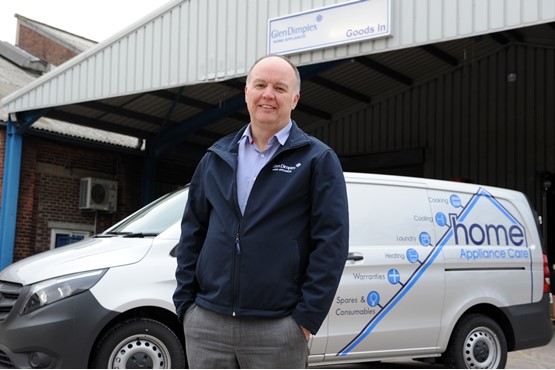
Glen Dimplex is a world leader in intelligent electric heating and renewable energy solutions and it is also a global supplier of domestic appliances, cooling and ventilation systems.
It operates from its headquarters in Dublin and owns a portfolio of brands including household names such as New World, Belling, Britannia Living, Stoves, LEC Refrigeration, Dimplex, Roberts Radio and Morphy Richards.
Vehicles are used throughout the UK as part of its delivery and servicing network.
The fleet had experienced issues relating to its previous vehicle suppliers and Winstone was looking for a brand that offered reliability, but also the level of support a commercial vehicle fleet needs when problems occur.
He says: “Our engineers are on the road every day. Experience has shown that their performance drops if they use a hired van, as happens when their vehicle goes in for a service or repair during normal working hours.
“In such cases, the engineer transfers only the tools and spares he thinks he might need that day. But you can never really know what’s going to be required until you reach the customer’s home and see the appliance.”
Rebooking appointments
This increases the risk that a driver may not have the right tools and will have to rebook an appointment, which is not ideal either from a cost or customer service perspective.
In response, Winstone opted for Mercedes-Benz as a supplier, with the fleet taking on Vito 111 CDIs, initially for its home appliance fleet with plans to extend orders to the entire 200 CVs.
READ MORE: Mercedes-Benz begins staggered Vito delivery to Glen Dimplex
Out of hours servicing was a key factor in the choice, to minimise disruption during routine maintenance and also provide immediate support for unscheduled repairs.
In addition to an expected improvement in reliability, the back-up available if any problems occur was a key factor in the decision-making process, according to Winstone.
He says: “We were disappointed in the service we were receiving from other manufacturers, with vans sat for several weeks waiting for repairs. The fact is, if the van is not on the road, it is not making money.
"Some manufacturers would rather service a supermini than a CV. They would invariably prefer to work on the car that comes into the workshop, because it’s so much more familiar to them than the van.
“With Mercedes-Benz Vans, its dealers are commercial vehicle specialists, not car dealers that fix a few vans.”
Winstone praises the support available from Mercedes-Benz through its MobiloVan roadside assistance service if vehicles do have problems while on the road.
“We talked to other van providers, but, ultimately, the 24-hour servicing capability and free MobiloVan breakdown cover tipped the scales in favour of Mercedes-Benz,” he says.
All Mercedes-Benz vans come with MobiloVan, if the vehicle is bought from an authorised dealer and serviced within the network.
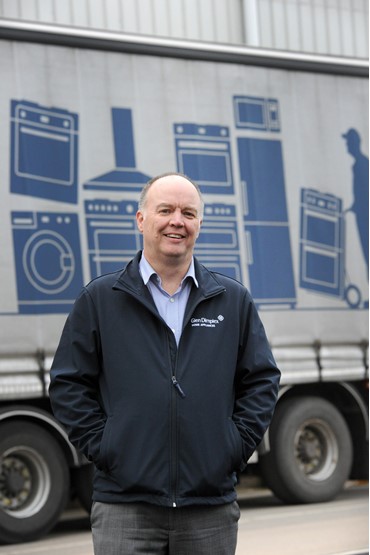
It is a free roadside assistance package, which offers European coverage and an average roadside repair rate of 80%.
The service covers issues such as misfuelling, running out of fuel, lost keys, two or more flat tyres, road accidents, vandalism and attempted theft.
Winstone adds: “If one of our previous suppliers’ vans broke down, we’d be attended at the roadside by a patrol from one of the major recovery organisations.
"These guys are working on all types of vehicle, though, so they cannot be expected to know all there is to know about a particular make.
“With MobiloVan, it will be a Mercedes-Benz technician who comes out. It stands to reason he will have a much better chance of fixing the vehicle there and then, before sending it on its way.”
Like every fleet, Glen Dimplex is assessing the impact of the increasing range of fuel options.
Small-scale EV trials
While the company has carried out small-scale trials of electric vehicles (EVs), they currently aren’t suitable for the high-mileage role carried out by much of the Glen Dimplex fleet.
Its vehicles can cover up to 120,000 miles during their four-year lifecycle with the fleet, although mileage can vary dependent on whether vans are city-based or operate in more rural areas.
Winstone says: “We have thought about alternatives and trialled EVs, but it is not suitable for our business and any change is still some years away.
“An important issue is where engineers would charge their vans, particularly if they have no driveway and take their vehicles home overnight.”
Instead, the Vito 111 CDI fleet is powered by 115PS 1.6-litre diesel engines offering up to 45.6mpg.
READ MORE: Road test: Mercedes-Benz Vito Crewvan LWB Sport review
The vehicles are fitted with tanks for AdBlue, the fuel additive which helps to slash nitrogen oxide emissions, so drivers must adapt to a new way of maintaining vehicles to ensure levels are kept topped up.
Winstone adds: “AdBlue is straightforward for drivers because they can buy it on their fuel card. It can mean smaller fuel tanks, but that’s something you get used to.
“If you let the tank run dry, then the van will go into limp mode and when the engine is turned off it won’t restart, so it is important to keep it topped up. We have briefed drivers and haven’t had any problems yet.
“If they try to leave it as long as possible, there is a warning when there is 500 miles worth left, which allows plenty of time to add more.”
Drivers are already used to planning ahead because the Glen Dimplex fleet has a supermarket-only fuel policy. Drivers can fill up at Morrisons, Tesco and Sainsbury’s using the FuelGenie fuel card.
No fees or surcharges
The FuelGenie supermarket network covers 1,350 locations nationwide and cards are provided without fees or account surcharges.
A fuel app helps drivers to identify the location of the nearest supermarket and they are encouraged to ensure they have enough fuel when taking motorway journeys.
READ MORE: Partnership between FuelGenie and UK Fuels increases service offering
Winstone says: “Our analysis showed that 80% of drivers were refuelling at supermarkets anyway, so we converted to it and the savings are substantial. We can save up to 20% compared to refuelling on motorways.
“There is a phone app that shows the nearest location and I encourage drivers to check it.”
While diesel continues to be the fuel of choice for the business, Winstone is keeping a close eye on the approaching introduction of clean air zones (CAZs) in cities throughout the UK.
CAZs will start coming into force in 2019, but there is a lack of certainty about their shape to guide fleet procurement teams.
While Glen Dimplex’s Euro 6 diesels are likely to escape any restrictions, it is still unclear whether this will be the case in every city.
Winstone says: “Something will happen, but there is very little detail.
"I went to a meeting in Oxford because there was talk of the city introducing restrictions, but there was no detail available and there wasn’t any structure to the plans.
“Whatever happens, people will still need deliveries and the wheels of the economy will have to keep turning.”
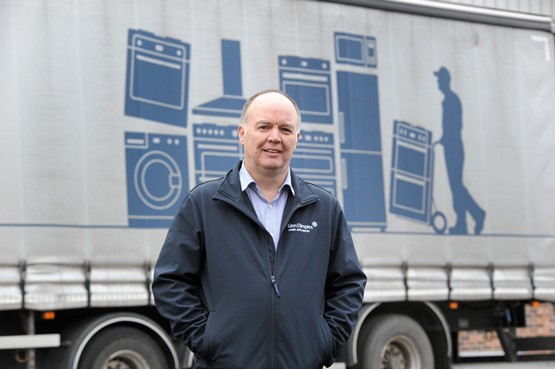
The environmental focus is set to extend further at Glen Dimplex as the business considers the implementation of a programme to use remanufactured parts on vehicles.
Winstone is reviewing the use of Mercedes-Benz ReMan parts, which are identical alternatives to new Mercedes-Benz parts, but with cost savings of up to 50%.
They are sometimes known as ‘service-exchange’ parts and are different to alternatives, such as reconditioned, repaired or recycled parts.
All Mercedes-Benz ReMan parts are disassembled, checked and components replaced to bring them back to the same standards as Mercedes-Benz new parts, which guarantees the same level of performance, whether new or used.
Mercedes-Benz argues that this differs from generally available reconditioned parts, which it says may include rust removal and replacement of failed components but does not normally include the full disassembly, testing or replacement of wearing items.
If replacement of parts is inconsistent, and only quick functional tests are performed, the longevity of parts, therefore, cannot be guaranteed.
Similarly, unapproved repaired parts usually only have the worn component replaced, without the other elements being inspected or tested, while recycled parts may still be in an acceptable condition, but they aren’t necessarily checked.
Winstone adds: “With Mercedes-Benz remanufactured parts, if it charges less than new price, but guarantees the part and replaces worn items, then it makes financial sense to consider it.

"We aren’t using it at the moment, but it is something we will be considering within the next two years.”
Winstone also uses telematics to drive efficiencies in fleet deployment and he is watching the development of the technology closely, particularly the growing level of telematics capability that is being fitted to vans as standard
He says: “I think this is the way the market will develop, with manufacturers providing systems in all their vehicles.
“If manufacturers provide the systems as standard in all their vehicles, then the market will respond and fleets will end up using manufacturer-based systems as a result.”
Multiple benefits
Currently, the fleet is using a system from Trackm8, which Winstone says offers multiple benefits, including improved fuel efficiency, enhanced safety and better customer service as the nearest engineer can be located and redirected for emergency calls.
Winstone also ensures drivers take practical steps to protect vehicles, such as removing hand tools and test equipment each night.
READ MORE: Trakm8 launches fully-online vehicle tracking solution
In addition to vehicle tracking, Winstone has specified additional features for Glen Dimplex’s new fleet vehicles, including air conditioning and parking sensors, to improve driver comfort and reduce avoidable incidents when manoeuvring, which can increase costs and off-road time.
He has also invested in a bespoke racking system with Bri-Stor, which it provided along with vehicle livery.
The racking includes specific locations for spare parts to make them easier to find, extra lighting, brackets for holding gas bottles, with lock boxes and refrigeration included where required.
Winstone was appointed fleet manager in 2007, but originally joined as a service engineer before becoming service manager.
He says: “During my time as service manager, I mentioned improvements I felt we could make to buying vans and my manager asked me to prove it.
“That led to me becoming fleet manager and then taking on a group fleet management role.”
In addition to the 200 vans, Winstone oversees the 320-vehicle car fleet, which is provided on a user-chooser basis from a list of around 20 cars covering most major fleet brands, with the list adapting to reflect the model choices that drivers most want.
He says: “We tend to acquire vehicles in batches. We have no issues or problems so far, but we will see how things go and we will consider other brands.”
















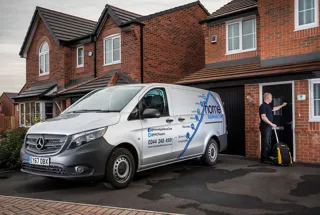
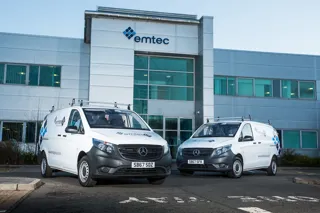
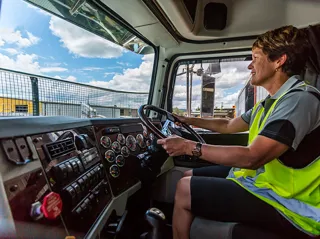
Login to comment
Comments
No comments have been made yet.